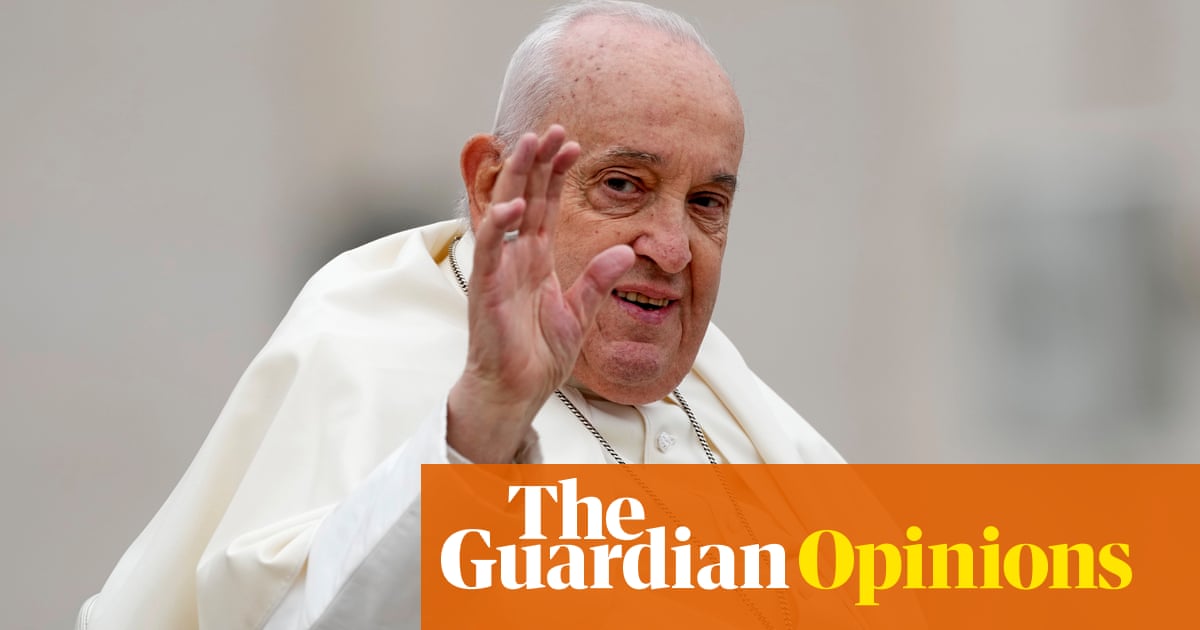Defying doctors’ orders to rest following his battle with double pneumonia, a weak Pope Francis last weekvisitedRome’s Regina Coeli prison, where he blew kisses towards inmates and spent half an hour in discussion with some of those incarcerated. Sadly, this Maundy Thursday encounter turned out to be one of the last acts of a supremely hardworking papacy. In retrospect, its location was entirely appropriate.
Throughout his 12 years in Saint Peter’s chair, Francis sought admirably to refocus the Catholic church’s energies on the marginalised, while challenging the power of entrenched interests. Coming, as heput it, “from the ends of the earth”, the first non-European pontiff of modern times was an outsider pope and a radical one. Within the church, the Argentine was a sometimes spikily direct reformer; outside it, he was a significant, high-profile ally of progressive causes.
As inward-looking nationalist movements dragged the west’s political compass steadily rightwards, Francis became an increasingly essentialcounterweighton interconnected issues such as migration, global heating and the fate of the global south.Laudato Si, his impassioned encyclical dedicated to the challenge of the climate emergency, was a moral and philosophical tour de force explicitly addressed to all people of good will.
In the Vatican, Francis made it his mission to modernise – with mixed success – a church hierarchy which he viewed as remote and self-satisfied. This task he memorablycomparedin 2018 to “cleaning the Sphinx of Egypt with a toothpick”. Condemnations of clerical arrogance were accompanied by an exhortation that the church should better engage with the messiness of human lives. In one of his most arresting descriptions of the kind of church that he wished to create, heimaginedit “as ‘a field hospital’ concerned more with those who suffer than defending its own interests”.
Emphasising compassion over doctrinal rigidity, and making plenty of conservative enemies along the way, Francis revived the more open, tolerant spirit of thesecond Vatican councilin the 1960s. Encapsulated in hisreplyto a question about gay people in the church – “Who am I to judge?” – this pastoral emphasis benefited the everyday lives of millions of Catholics.
Blessings for unmarried and same-sex couples are now in place, along with a relaxation of rules barring divorcees and remarried people from receiving communion. Women play agreaterrole in running Catholic institutions, although they are no nearer to being admitted to the priesthood. The global debate that Francis initiated among Catholics about the future of their church – thesynod on synodality– galvanised the grassroots.
Traditionalists railed at these changes, some to the point of questioning Francis’s papal legitimacy. Liberals inside and outside the church would argue that they could have gone much further, encompassing at least the introduction offemale deacons, for example, and same sex-marriage. As a non-doctrinaire theological conservative, Francis was never likely to satisfy either camp. His achievements as an outward-facing pope, engaged with the world and its crises, should nevertheless be seen as considerable.
In an era when the postwar legacy of universal human rights is under threat, and Christianity isweaponisedin the west as a form of identity politics, Francis stood up for a gospel message of humility, inclusion and love for the stranger. By a quirk of fate, one of his last public engagements was an Easter Sundaymeetingwith the Catholic US vice-president, JD Vance, whose “America first” views on international aid and migration he had trenchantlycriticisedbefore falling ill. Progressives of all faiths and none will miss that urgent advocacy on behalf of those whose own voices are too seldom listened to.
Do you have an opinion on the issues raised in this article? If you would like to submit a response of up to 300 words by email to be considered for publication in ourletterssection, pleaseclick here.
